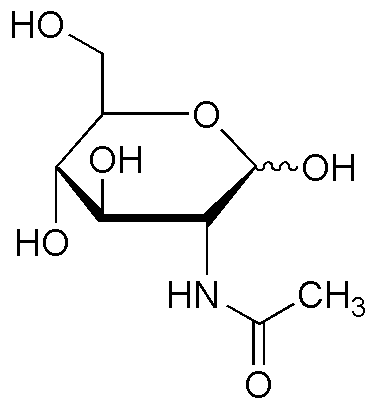N-Acetyl-D-glucosamine is widely utilized in research focused on:
- Dietary Supplements: Commonly found in joint health products, it helps support cartilage and may alleviate symptoms of osteoarthritis, making it popular among health-conscious consumers.
- Cosmetic Formulations: Used in skincare products for its moisturizing properties, it aids in skin hydration and may improve skin barrier function, appealing to the beauty industry.
- Pharmaceuticals: Acts as a precursor for the synthesis of glycosaminoglycans, which are important for drug formulations targeting inflammatory diseases.
- Food Industry: Employed as a food additive for its thickening and stabilizing properties, enhancing the texture and shelf-life of various products.
- Biotechnology: Utilized in cell culture media to promote cell growth and differentiation, particularly in research involving stem cells and tissue engineering.
Informations générales
Propriétés
Sécurité et réglementation
Applications
N-Acetyl-D-glucosamine is widely utilized in research focused on:
- Dietary Supplements: Commonly found in joint health products, it helps support cartilage and may alleviate symptoms of osteoarthritis, making it popular among health-conscious consumers.
- Cosmetic Formulations: Used in skincare products for its moisturizing properties, it aids in skin hydration and may improve skin barrier function, appealing to the beauty industry.
- Pharmaceuticals: Acts as a precursor for the synthesis of glycosaminoglycans, which are important for drug formulations targeting inflammatory diseases.
- Food Industry: Employed as a food additive for its thickening and stabilizing properties, enhancing the texture and shelf-life of various products.
- Biotechnology: Utilized in cell culture media to promote cell growth and differentiation, particularly in research involving stem cells and tissue engineering.
Documents
Fiches de données de sécurité (FDS)
La FDS fournit des informations de sécurité complètes sur la manipulation, le stockage et l’élimination du produit.
Spécifications du produit (PS)
Le PS fournit une description complète des propriétés du produit, notamment sa composition chimique, son état physique, sa pureté et les exigences de stockage. Il détaille également les plages de qualité acceptables et les applications prévues du produit.
Certificats d'analyse (COA)
Recherchez des certificats d'analyse (COA) en saisissant le numéro de lot du produit. Les numéros de lot et de lot se trouvent sur l'étiquette d'un produit, après les mots « Lot » ou « Lot de fabrication ».
Numéro de catalogue
Numéro de lot/série
Certificats d'origine (COO)
Ce certificat d'exploitation confirme le pays dans lequel le produit a été fabriqué, et détaille également les matériaux et composants utilisés et s'il est issu de sources naturelles, synthétiques ou autres sources spécifiques. Ce certificat peut être requis pour les douanes, le commerce et la conformité réglementaire.
Numéro de catalogue
Numéro de lot/série
Fiches de données de sécurité (FDS)
La FDS fournit des informations de sécurité complètes sur la manipulation, le stockage et l’élimination du produit.
DownloadSpécifications du produit (PS)
Le PS fournit une description complète des propriétés du produit, notamment sa composition chimique, son état physique, sa pureté et les exigences de stockage. Il détaille également les plages de qualité acceptables et les applications prévues du produit.
DownloadCertificats d'analyse (COA)
Recherchez des certificats d'analyse (COA) en saisissant le numéro de lot du produit. Les numéros de lot et de lot se trouvent sur l'étiquette d'un produit, après les mots « Lot » ou « Lot de fabrication ».
Numéro de catalogue
Numéro de lot/série
Certificats d'origine (COO)
Ce certificat d'exploitation confirme le pays dans lequel le produit a été fabriqué, et détaille également les matériaux et composants utilisés et s'il est issu de sources naturelles, synthétiques ou autres sources spécifiques. Ce certificat peut être requis pour les douanes, le commerce et la conformité réglementaire.


